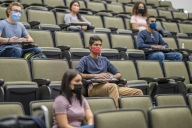You have /5 articles left.
Sign up for a free account or log in.
As the use of electronic cigarettes grows, colleges are trying to determine whether the products fall under their tobacco-free policies, many of which were adopted before the new form of smoking took off.
The University of Iowa became a smoke-free campus after a 2008 state law prohibited smoking in public places. At the time, e-cigarettes — battery-powered devices not monitored by the Food and Drug Administration that provide doses of nicotine and other additives — were not on the university’s radar. Now, university groups, including the Faculty Senate, are discussing whether e-cigarettes should be included in the ban.
It’s hard for university groups to come to an agreement, university spokesman Tom Moore said. Some faculty and staff members believe e-cigarettes are unhealthy and would be a distraction in classrooms; others are wary of adding e-cigarettes to the ban until further research on the devices takes place.
“There are many more questions than answers at this stage,” Moore said, adding the university does not have a timeline for making a decision.
The Centers for Disease Control and Prevention has said e-cigarettes prompt "great concern" because not much is understood about their long-term effects. A CDC study found the percentage of American middle and high school students who use e-cigarettes more than doubled from 2011 to 2012. More than 1.78 million such students had tried e-cigarettes.
If Iowa decides to forbid e-cigarettes, it would join a growing number of college campuses that have enacted similar bans. Because e-cigarettes are becoming well-known, colleges and that have recently created tobacco-use policies are more likely to include e-cigarettes, said Clifford Douglas, director at the University of Michigan Tobacco Research Network. Of the 1,178 campuses that enacted smoke-free policies as of July 2013, 793 are tobacco-free, according to the Americans for NonSmokers’ Rights Foundation. Many of the tobacco-free policies explicitly bar e-cigarettes.
Ohio State University set a “major precedent” in banning e-cigarettes as part of its tobacco-free policy, which launches in January 2014, Douglas said. The Ohio State policy prohibits all tobacco products, including cigarettes, electronic cigarettes, cigars and cigarillos, hookah-smoked products, pipes, oral tobacco and nasal tobacco, as well as any product “intended to mimic tobacco products, contain tobacco flavoring or deliver nicotine other than for the purpose of cessation,” according to the policy.
More colleges and universities are moving toward smoke-free, or even tobacco-free, environments. Only three colleges in Maine were tobacco-free at the beginning of 2013, said Sarah Mayberry, program director at the Maine Tobacco-Free College Network. By the fall, 10 of the 34 institutions of higher education in Maine had adopted tobacco-free policies, Mayberry said.
The organization advises colleges to ban e-cigarettes because they send a mixed message that smoking is allowed on-campus.
E-cigarettes, which have been marketed as cessation devices, are “clearly less hazardous” than regular cigarettes, Douglas said. But those who use e-cigarettes to curb their smoking are probably not doing as much good for their body as they may believe, he said.
Some colleges and universities, including the University of Michigan, have responded to concerns about e-cigarettes without fully banning the product. The University of Michigan’s smoke-free policy took effect before e-cigarettes became popular and the university recently banned e-cigarettes in its health complex, Douglas said. The devices are still permitted on other parts of campus, he said.
Still, others are waiting for more conclusive research on e-cigarettes before deciding whether to ban them. When Northeastern University formulated its smoke-free policy, it decided not to ban e-cigarettes, said Terry Fulmer, dean of the Bouve College of Health Sciences and chair of the university’s smoke-free committee. There is not yet evidence that e-cigarette use is harmful to the general public as is secondhand smoke from regular cigarettes, she said, and the university wanted to focus on smoking as a public health issue. The policy went into effect this August and could evolve in the future, she said.
Administrators at Pima Community College in Arizona have submitted a revamped smoking policy to its board that would restrict smoking, e-cigarette use and tobacco use to designated on-campus areas so nonsmokers could avoid secondhand smoke, said the college spokesman, C.J. Karamargin. The current policy does not mention tobacco use or e-cigarettes.
The industry group for e-cigarettes, perhaps not surprisingly, argues that there is no reason to ban them. Smoke-free or tobacco-free policies are often adopted because “it’s the thing to do” and are loosely enforced, said Gregory Conley, legislative director at the Consumer Advocates for Smoke-Free Alternatives Association. Without research on the risks of e-cigarette use on bystanders, campuswide bans makes little sense, he said.








